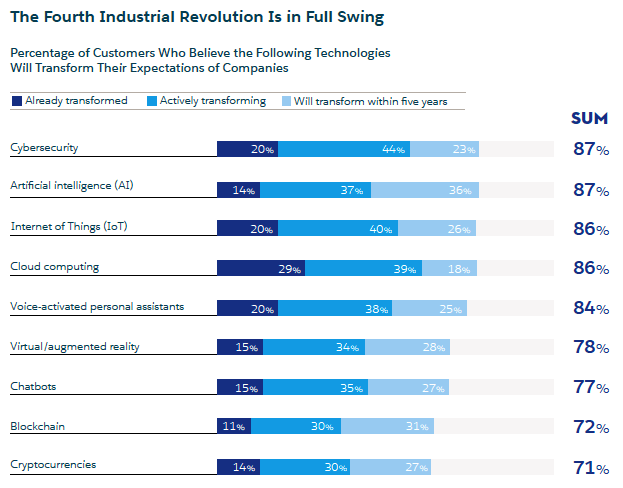The advantages of the Fourth Industrial Revolution
Enabling technologies and benefits for SMEs
The advent of the Fourth Industrial Revolution has led to the definition of a new scenario in the industrial world, also concerning the technologies that support the processes carried out during work activities. There is a great discussion around technologies such as the Internet of Things, Virtual Reality, Artificial Intelligence, Robotics, Cloud Computing, and other technologies as illustrated in the following diagram:

This has led to significant changes, such as the way products are conceived, and the necessary speed and flexibility to adapt the changes that affect one’s way of working or producing. Access to some of these technologies, such as cloud computing or cloud systems, enables reconsiderations and improvements of one’s work processes thanks to a range of benefits. Cloud computing can indeed be defined as a set of tools and software technologies made available on the internet without the need for internal equipment in the company. In particular, we can identify at least 7 benefits:
- advantages in terms of cost: no hardware to deal with, no system update costs, and no need for recalculations of resources needed every month. For a fixed monthly fee per user, equivalent to the cost of a cappuccino, access to a secure and up-to-date cloud workstation is available. In this way, ease of access to highly effective tools is guaranteed even for small businesses with limited budgets;
- wide range of options: different usage modes can be activated depending on the needs: IaaS, PaaS, SaaS (from low-level services on which to build a business ecosystem, to high-level ones that already include all ready-to-use software platforms);
- scalability: based on the increasing number of users and the time horizon, resources can be increased/decreased according to their needs;
- integration: existing cloud platforms increasingly create an interconnection between their systems over time, ensuring high execution speed and easy integration between systems made available by different providers;
- security assurance and standard compliance: each provider offering cloud services provides high-level SLAs on the service and meets most existing security standards;
- business continuity: cloud systems include a variety of mechanisms capable of responding to disaster recovery issues and immediate recovery of stored data in case of problems that affect the provider’s equipment, ensuring the continuity of the service offered;
- ease of innovation: each update is managed and published directly on the cloud platforms so that the user can benefit from the most up-to-date and secure version of what they use, automatically integrating procedures for resolving bugs and addressing security issues;
The deployment of services on cloud systems also requires special attention to certain dynamics:
- authentication and authorization: it is necessary to pay attention to user authentication policies that can access certain sections of the company systems that are moved to the cloud, respecting the correct preparation of new users and profiles;
- security and privacy: user privacy must be guaranteed in accordance with the policies offered by the cloud system provider, ensuring control possibilities for company management, without neglecting any security aspects for system users;
- integration with internal software systems: it is important to bear in mind that there are various kinds of company digital systems and not all are always completely migrated to the cloud. After migration to the cloud, it becomes necessary to restore connections and data exchange between internal software systems and the new cloud platforms;
- content ownership and geographic location: the activation of cloud platforms must be carefully studied, especially in relation to the possible geographic locations of the cloud system provider’s servers. Different geographical locations, in fact, provide different normative treatments of content and data ownership, to be evaluated before any platform activation operation.
If you are interested in further learning how your company can reap the benefits offered by the Fourth Industrial Revolution, you can contact the Inobeta team, which boasts years of experience in the cloud computing sector, certified by the AWS Cloud Solution Architect.
References
https://www.borsaitaliana.it/notizie/sotto-la-lente/rivoluzione-252.htm
https://www.salesforce.com/it/blog/2019/08/che-cosa-quarta-rivoluzione-industriale.html
https://ieeexplore.ieee.org/document/6185026/references#references

INOBETA S.R.L.S.
Piazza Falcone e Borsellino 21
47121 – Forlì (FC), Italy
Phone: +39 0543 1653749
R.E.A.: FO – 335272
P.IVA e CF: 04238170403
Capitale Sociale: € 7.000 i.v.
PEC: inobeta@pec.it
info@inobeta.net
